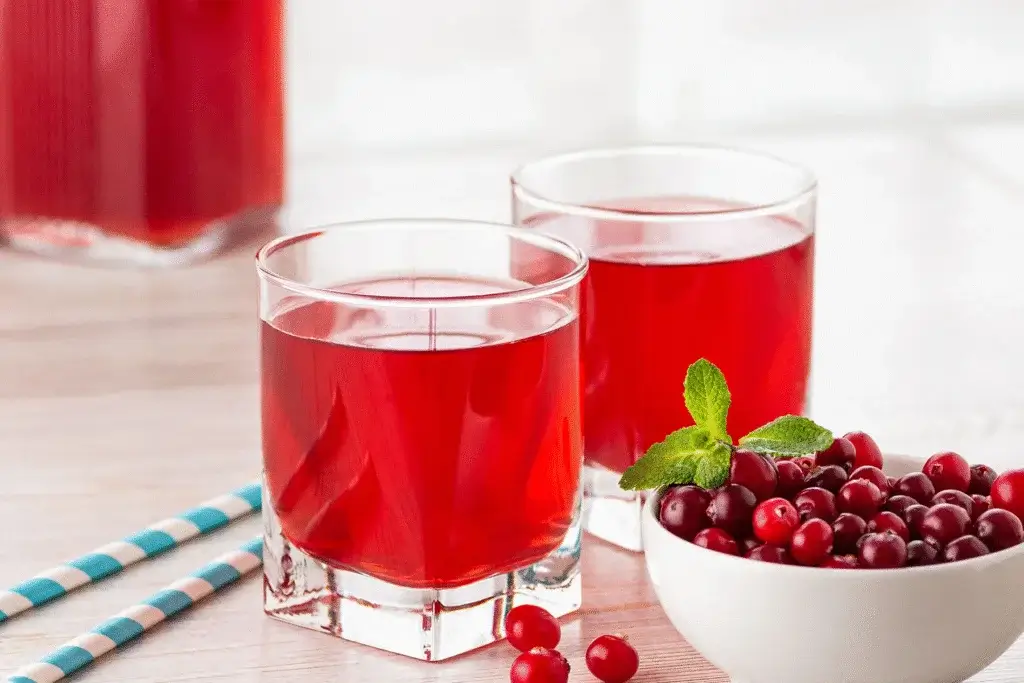Introduction
I Drank Cranberry Juice for 7 Days — Here’s What Happened . Cranberry Juice Benefits
As we get older, staying healthy often comes down to small, consistent choices. Sometimes, it’s not about medicine or supplements — but about what we drink every day. That’s why I decided to try a 7-day cranberry juice challenge. I wanted to see if this ruby-red drink, often praised for urinary tract health and its rich antioxidants, could truly make a difference in my daily wellness.
Like many adults in their 60s, I’ve dealt with occasional digestive discomfort, low energy, and other signs of aging. I wasn’t expecting miracles, but I was curious to see whethepure cranberry juice advantages would be noticeable in just one week.
Why Cranberry Juice Is More Than Just Tart and Tasty

Before I began, I did some research. Cranberry juice isn’t just a flavorful drink — it’s been studied for its role in preventing urinary tract infections (UTIs), thanks to natural compounds called proanthocyanidins that help prevent harmful bacteria from sticking to the urinary tract walls. For older adults, especially women, this is an especially important benefit.
But that’s just the beginning. Cranberries are rich in vitamin C, antioxidants, and anti-inflammatory properties that may also support heart health, improve immune function, and even help with digestive comfort.
However, not all cranberry juice is created equal. Many brands add sugar — sometimes more than a can of soda — which can cancel out many of the health perks. That’s why I chose 100% pure, unsweetened cranberry juice, even though I knew it would be a bit of a shock to the taste buds.
Day One: A Tart Wake-Up Call
Each morning, I drank one 8-ounce glass of unsweetened cranberry juice with breakfast. No ice, no sweeteners. The taste was intense — sour and tart — but surprisingly refreshing. To balance the acidity, I made sure to drink plenty of water throughout the day.
Small but Encouraging Changes
By Day 3, I noticed subtle improvements. My digestion felt smoother, with less bloating after meals. My afternoon energy slump wasn’t as noticeable, and I felt more focused. Interestingly, I didn’t crave sweets as much — the bold flavor of the juice seemed to satisfy my taste buds.
However, I did feel mild heartburn one day, a reminder that cranberry juice side effects can occur if consumed in large amounts, especially for people with sensitive stomachs.
foods for better digestion https://www.quickyyourrecipes.com/comforting-chicken-soup-recipe/
OAfter 7 Days: My Results
At the end of the week, here’s what I observed:
- Better digestion: less bloating and smoother digestion.
- More energy: mornings felt easier without needing extra coffee.
- Clearer skin: a refreshed look, possibly from the antioxidants.
- Minor acidity: only occasional mild heartburn.
Did cranberry juice cure all my health concerns? Of course not. But it gave me noticeable improvements in energy, digestion, and overall wellness.
What Science Says About Cranberry Juice Benefits
Research confirms several benefits of cranberry juice:
Digestive Health: natural acids and fibers may improve gut bacteria balance.
UTI Prevention: reduces risk by preventing bacteria like E. coli from sticking to urinary tract walls.
Heart Health: antioxidants in cranberries can lower LDL cholesterol and support cardiovascular function.
Immunity & Inflammation: high vitamin C and polyphenols help fight inflammation and boost the immune system.
Nutritional Profile of Cranberry Juice
A standard 8-ounce glass of this juice typically contains:
- Calories: 110
- Carbohydrates: 27 g
- Sugars: 23 g (natural)
- Vitamin C: 26% of the daily recommended intake
- Vitamin E and K: trace amounts
- Antioxidants: high in flavonoids and proanthocyanidins
This nutrient-dense profile explains why cranberry juice is considered more than just a refreshing beverage. It packs a strong antioxidant punch that contributes to overall health.
The Downside: When to Be Cautious
Despite his many advantages, it’s not suitable for everyone. Its acidity can trigger reflux or heartburn. It may also interact with blood thinners like warfarin. And beware of “cranberry cocktails” — they’re often loaded with sugar, which cancels out many health perks.
Who Should Avoid Drinking Too Much Cranberry Juice?
While cranberry juice has many proven health benefits, there are certain groups of people who should be cautious:
- People with diabetes: Even unsweetened cranberry juice contains natural sugars that can raise blood sugar levels.
- Individuals prone to kidney stones: Cranberries are high in oxalates, which may increase the risk of kidney stone formation.
- Those taking blood thinners: As mentioned, cranberry juice can interact with medications like warfarin.
- People with sensitive stomachs: Its acidity may cause discomfort or worsen acid reflux.
Creative Ways to Add Cranberry Juice to Your Diet
If drinking straight cranberry juice feels too tart, there are plenty of ways to incorporate it into your meals:
- Mix it with apple or pear juice for a sweeter, balanced flavor.
- Add it to smoothies with banana, spinach, or berries.
- Use it as a base for salad dressings with olive oil and honey.
- Freeze it into ice cubes and add to sparkling water for a refreshing drink.
These methods not only make it more palatable but also allow you to enjoy the benefits without overwhelming your taste buds.
for more information https://www.healthline.com/health/food-nutrition/cranberry-juice-benefits?utm_source=chatgpt.com#source-for-vitamin-c-and-e
Cranberry Juice vs. Cranberry Supplements
Some people opt for cranberry supplements instead of juice, especially if they dislike the tart taste. While supplements can provide concentrated benefits, they often lack the hydration and natural vitamin C found in juice. On the other hand, supplements are lower in sugar and may be easier on sensitive stomachs.
The choice ultimately depends on your lifestyle and preferences. If you enjoy the taste, fresh juice may be the better option. If not, supplements are a practical alternative.
Would I Keep Drinking It? My Honest Reflection
After a week of daily cranberry juice, would I continue? Yes — but with a few tweaks.
I plan to drink it every other day instead of daily, and possibly dilute it with water or blend it with gentler juices like apple or pear. That way, I still get the benefits without overwhelming my stomach.
I also learned the importance of listening to your body. Just because something is healthy doesn’t mean you need it in large amounts. Moderation truly is key — especially as we age.
Medical News Today — Health Benefits and Side Effects of Cranberry Juice https://www.medicalnewstoday.com/articles/322731?utm_source=chatgpt.com
Final Reflection: Is It Worth It?
After a week, I’ve decided to keep drinking cranberry juice — but in moderation. I’ll enjoy it every other day, sometimes diluted with water or blended with apple juice for balance.
For adults over 60, cranberry juice for heart health make it a valuable natural option for better digestion, improved energy, and UTI prevention. It’s not a magic cure, but one simple glass a day can be a step toward healthier living.
